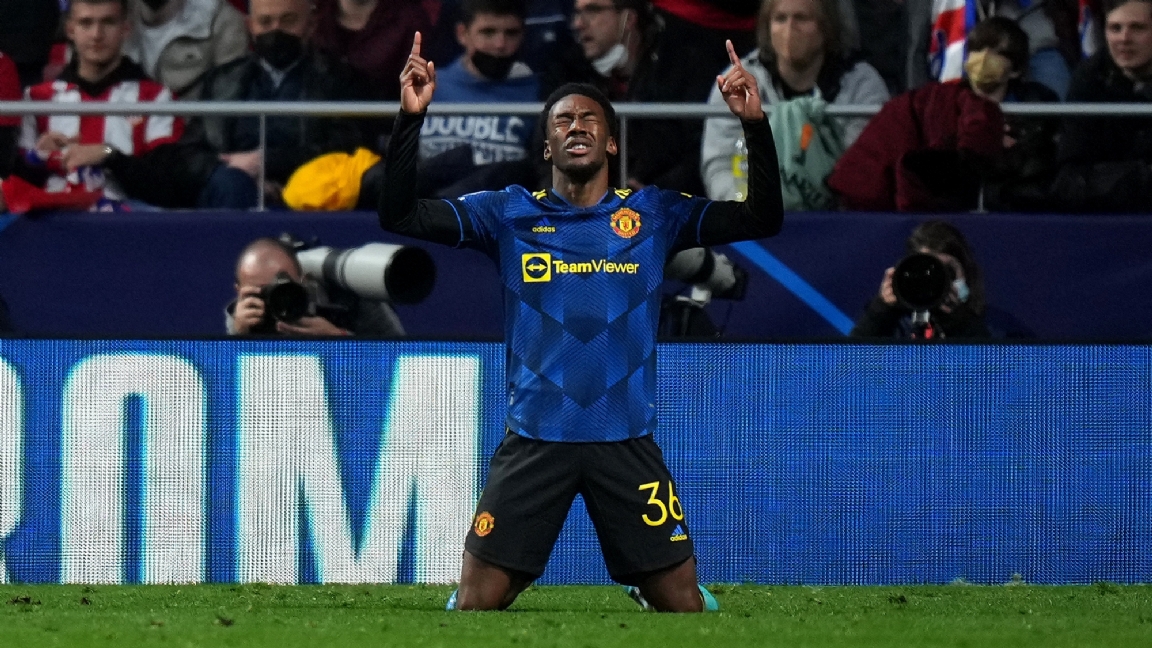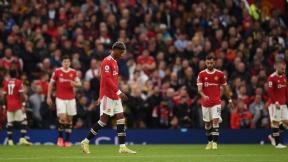![]()

In a season where everything Manchester United touch seems to turn into frustration, it’s hard to look for bright spots. Ole Gunnar Solskjaer couldn’t get the selection of the English superpower to talk and successor Ralf Rangnick seems to be just as bad. It stands out all the more when a product from our own factory manages to bring the necessary impetus. Where former Young Player of the Year award winner Marcus Rashford has failed this season, 19-year-old Anthony Elanga gives United hope in dark times.
By Tom Röfekamp
We are in the eightieth minute of the Champions League match between Atlético Madrid and Manchester United. João Felix gave the Spaniards the lead early in the Wanda Metropolitano with a nice header; United have been able to do nothing, really nothing, in the 73 minutes after that. Bruno Fernandes puts the ball once again, in good hope, in the direction of the sixteen-meter area. Atléti defender Reinildo estimates the ball completely wrong, as a result of which it ends up in the feet of a brand new substitute of the opponent. That substitute doesn’t hesitate for a moment, and gives his shot just enough speed and precision to beat goalkeeper Jan Oblak. Anthony Elanga gives Manchester United a very, very undeserved point, and a creditable starting position for the return at Old Trafford, March 15.
“He plays like it’s a dream come true,” Rangnick said of his pupil after the game. “It’s a pleasure to watch him play. I wish some people took an example from him – a role model, you could call him that.” Rangnick did not name any players, but there is a good chance that the German was referring to the direct competitors of Elanga who did appear at the starting signal: Jadon Sancho and Marcus Rashford. The former has yet to live up to its £85million price tag, while Rashford has struggled with his form all season.

The ‘Prince’ of Manchester United everyone hopes will rise now
Competitor of Elanga Marcus Rashford has been struggling with a serious form dip since his return from a shoulder injury in mid-October.
Elanga, who was only transferred to United’s first selection at the end of last season, brings a certain freshness to the wings compared to his competitors. The Swede is faster and more explosive than both Sancho and Rashford, is more daring and, unlike his fellow attackers, has everything to prove. The urge to develop is enormous. Former United Under-23 manager Neil Wood already called Elanga “one of the hardest workers they’ve had” and “the first to put in extra work after training” at the end of 2020. All that labor to follow in the footsteps of his great idol: Thierry Henry.
As a child in a real football family, Elanga grew up in Malmö, where father (and seventeen-time Cameroonian international) Joseph earned his living at the local FF. Anthony fell in love with the game through his father, he told in 2020 The Athletic† “I went to all the matches, knew all the songs of the fans and knew everything about the rivalry with Helsingsborgs IF and AIK from Stockholm.” The youngest Elanga played briefly in the youth academy of IF Elfsborg in his native country, before moving to England with his family in 2013, at the request of his mother.
There, Elanga in the shirt of the amateurs of Hattersley was soon noticed by scouts from both top clubs from Manchester. His Hattersley coach, Ian Forder, saw just ten minutes into their meeting that Elanga was something special. “Anthony came here to take a look at Hyde United, who train on the fields next to us,” Forder recalled in June last year. “He seemed quite lost. I went to him and asked, “Can I help you?” He asked if we were Hyde United. I said no, and offered to come train with us. He put on his shoes and came onto the field. Ten minutes later I printed a registration form right in front of his mother!”
Forder trained Hattersley’s Under-14, while Elanga fell into the Under-12 age bracket. Still, the youngster was head and shoulders above his teammates, making Forder’s prediction that he wouldn’t be with the club long came true – and probably sooner than expected, in fact. Only twelve matches (and seventeen goals) later, Elanga was allowed to come by for a sniffing internship at Manchester City. The talent declined the interest and eventually opted for fellow city rivals and arch-rival United.
Elanga went through the different youth teams of the Red Devils trouble-free and even won the Jimmy Murphy Award, the club’s best youth player award, at the end of the 2019/20 season. With this, Elanga followed in the footsteps of Ryan Giggs, Paul Scholes, Phil Neville and current teammate Rashford, among others. The strong play of Elanga in the Under-23 also did not go unnoticed by Solskjaer. The manager of United’s main squad, who was fired in November, brought Elanga into the selection several times at the end of last season, before the attacker was thrown to the lions on 11 May 2021 (directly as a basic player) in the duel with Leicester City. However, the debutant was unable to make his mark in the 66 minutes he got, and saw United fall 1-2.
Solskjaer seemed unconvinced. The Norwegian only called on Elanga twice until his congé, with 17 minutes in the EFL Cup against West Ham United being his only of the current year – as a left-back, of course. Elanga hinted at a rental, but Rangnick’s arrival changed everything. One training session was enough for the new trainer to see the potential of his new pupil. Rangnick asked Elanga to stay with United at least until the end of the winter transfer window so that he could show in the interim training sessions and games that he was actually entitled to more playing time.
Where Elanga still had to make do with a single appearance in the Champions League against Young Boys (1-1) in December, the playing minute counter started to increase considerably in January. Elanga was given back-to-back starting spots against Aston Villa, Brentford and West Ham United, deciding to grant Rangnick’s wish and stay. However, Elanga was still not sure of a place on the starting form. United’s attack continues to be erratic, leaving Rangnick still in the midst of his quest for the ideal formation. Elanga is also not excluded from Rangnick’s roulette with the front four, which means that the attacker has to alternate base places with sometimes excruciatingly short raids.
In recent weeks, however, Elanga seizes his opportunities with both hands. Away from Leeds United, the winger provided the final chord to a 2-4 win; at Atlético he secured a point with his very first Champions League goal. Slowly but surely, the supporters of Manchester United therefore close Elanga in his heart. Fans playfully changed the name of stadium Elland Road on the Wikipedia page to ‘Elanga Road’ after Leeds out, while playing the melody of the eurodance song Rhythm Is A Dancer from the German group SNAP! used to create a personal chant for Elanga. With their newfound love, the supporters finally regain some of the fun that the rest of United’s attack seems to have lost, and so make no effort to hide their joy.
† Who changed Elland Road to Elanga Road on Wikipedia. #MUFC † pic.twitter.com/jGPtwt7UEK
— UtdPlug (@UtdPlug) February 21, 2022
Rhythm is a dancer… ????#MUFC † #UCL pic.twitter.com/mEIVLxoKjp
— Manchester United (@ManUtd) February 24, 2022
Still, analysts don’t seem sold. Gary Neville may have called Elanga ‘a nightmare to play against’, but that was after a game against Salford City’s Under-23s (6-0, Elanga scored twice). Since his entrance at the highest level, the eulogies seem a lot more nuanced. Michael Owen and Rio Ferdinand agreed after the game with Atlético that Elanga is someone who can make a difference, but in the current Manchester United. The comparison with club legends such as Wayne Rooney and Giggs was flawed, both judged.
That’s exactly why it’s hard to estimate where Elanga’s ceiling is. Does he stand out only because of the mediocrity of United’s selection, or do we see a future Ballon d’Or candidate here? You would say that that question can only be answered when the fallen superpower crawls out of the sporting valley he is in. For now United will have to make do with this sparse ray of light in the darkness.
